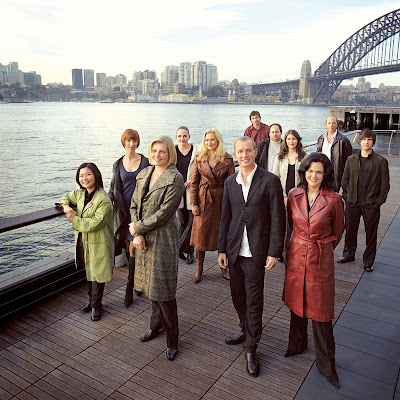Last month | Next monthClassical Month in Washington is a monthly feature. If there are concerts you would like to see included on our schedule, send your suggestions by e-mail (ionarts at gmail dot com). Happy listening!July 1, 2007 (Sun)
2 pmJohn Musto,
VolponeWolf Trap Opera
The Barns at Wolf Trap
July 1, 2007 (Sun)
5 pmPaul Jacobs, organ [FREE]
Washington National CathedralJuly 1, 2007 (Sun)
6 pmDana LaRosa, organ [FREE]
Summer Organ Recital SeriesBasilica of the National Shrine of the Immaculate Conception
July 4, 2007 (Wed)
11 amIndependence Day Organ Concert [FREE]
Erik Wm. Suter and Scott Hanoian, Cathedral Organists
Washington National CathedralJuly 8, 2007 (Sun)
3 pmD.C. Youth Orchestra Reunion Concert [FREE, tickets required]
Kennedy Center Concert Hall
July 8, 2007 (Sun)
6 pmMickey Thomas Terry, organ [FREE]
Summer Organ Recital SeriesBasilica of the National Shrine of the Immaculate Conception
July 10, 2007 (Tue)
9 amPreliminary Round 1William Kapell International Piano Competition and Festival
Clarice Smith Performing Arts Center (College Park, Md.)
July 11, 2007 (Wed)
9 amPreliminary Round 2William Kapell International Piano Competition and Festival
Clarice Smith Performing Arts Center (College Park, Md.)
July 11, 2007 (Wed)
7 pmWashington Symphonic Brass [FREE]
The Lawn at Strathmore
July 12, 2007 (Thu)
9 amPreliminary Round 3William Kapell International Piano Competition and Festival
Clarice Smith Performing Arts Center (College Park, Md.)
July 12, 2007 (Thu)
2 pmInsights: Conversation with Garrick OhlssonWilliam Kapell International Piano Competition and Festival
Clarice Smith Performing Arts Center (College Park, Md.)
July 12, 2007 (Thu)
8 pmGarrick Ohlsson, pianoWilliam Kapell International Piano Competition and Festival
Clarice Smith Performing Arts Center (College Park, Md.)
July 13, 2007 (Fri)
3 pmSemifinalist Solo Round 1William Kapell International Piano Competition and Festival
Clarice Smith Performing Arts Center (College Park, Md.)
July 13, 2007 (Fri)
8 pmCirque de la SymphonieBaltimore Symphony Orchestra
Meyerhoff Symphony Hall (Baltimore, Md.)
July 14, 2007 (Sat)
3 pmSemifinalist Solo Round 2William Kapell International Piano Competition and Festival
Clarice Smith Performing Arts Center (College Park, Md.)
July 14, 2007 (Sat)
7:30 pmPuccini,
ToscaSummer Opera Theater Company
Hartke Theater, Catholic University
July 15, 2007 (Sun)
3 pmSemifinalist Solo Round 3William Kapell International Piano Competition and Festival
Clarice Smith Performing Arts Center (College Park, Md.)
July 15, 2007 (Sun)
6 pmJulie Vidrick Evans, organ [FREE]
Summer Organ Recital SeriesBasilica of the National Shrine of the Immaculate Conception
July 17, 2007 (Tue)
11 amInsights: David Finckel and Wu HanWilliam Kapell International Piano Competition and Festival
Clarice Smith Performing Arts Center (College Park, Md.)
July 17, 2007 (Tue)
2 pmSemifinalist Chamber Round 1William Kapell International Piano Competition and Festival
Clarice Smith Performing Arts Center (College Park, Md.)
July 17, 2007 (Tue)
8 pmDavid Finckel (cello) and Wu Han (piano)William Kapell International Piano Competition and Festival
Clarice Smith Performing Arts Center (College Park, Md.)
July 18, 2007 (Wed)
11 amInsights: Marilyn Nonken and Jason EckardtWilliam Kapell International Piano Competition and Festival
Clarice Smith Performing Arts Center (College Park, Md.)
July 18, 2007 (Wed)
2 pmSemifinalist Chamber Round 2William Kapell International Piano Competition and Festival
Clarice Smith Performing Arts Center (College Park, Md.)
July 18, 2007 (Wed)
7:30 pmPuccini,
ToscaSummer Opera Theater Company
Hartke Theater, Catholic University
July 18, 2007 (Wed)
8 pmPhilip Glass, pianoWilliam Kapell International Piano Competition and Festival
Clarice Smith Performing Arts Center (College Park, Md.)
July 19, 2007 (Thu)
11 amInsights: Treasures from the Kapell ArchivesWilliam Kapell International Piano Competition and Festival
Clarice Smith Performing Arts Center (College Park, Md.)
July 19, 2007 (Thu)
2 pmInsights: The Performance PianoWilliam Kapell International Piano Competition and Festival
Clarice Smith Performing Arts Center (College Park, Md.)
July 19, 2007 (Thu)
8 pmAnne-Marie McDermott, pianoWilliam Kapell International Piano Competition and Festival
Clarice Smith Performing Arts Center (College Park, Md.)
July 19, 2007 (Thu)
8:15 pmNational Symphony OrchestraWith Lang Lang, piano
Filene Center at Wolf Trap
July 20, 2007 (Fri)
11 amInsights: Anne-Marie McDermottWilliam Kapell International Piano Competition and Festival
Clarice Smith Performing Arts Center (College Park, Md.)
July 20, 2007 (Fri)
2 pmInsights: Steven Mayer (on Art Tatum)William Kapell International Piano Competition and Festival
Clarice Smith Performing Arts Center (College Park, Md.)
July 20, 2007 (Fri)
8 pmAhmad Jamal (jazz trio)William Kapell International Piano Competition and Festival
Clarice Smith Performing Arts Center (College Park, Md.)
July 20, 2007 (Fri)
8:15 pmNational Symphony OrchestraWith James Galway, flute
Filene Center at Wolf Trap
July 20, 2007 (Fri)
8 pmA Night in HavanaBaltimore Symphony Orchestra
Meyerhoff Symphony Hall (Baltimore, Md.)
July 21, 2007 (Sat)
8 pmFinal Concerto Round (with Baltimore Symphony Orchestra)
William Kapell International Piano Competition and Festival
Clarice Smith Performing Arts Center (College Park, Md.)
July 22, 2007 (Sun)
2:30 pmPuccini,
ToscaSummer Opera Theater Company
Hartke Theater, Catholic University
July 22, 2007 (Sun)
6 pmPaul Skevington, organ, and Phil Snedecor, trumpet [FREE]
Summer Organ Recital SeriesBasilica of the National Shrine of the Immaculate Conception
July 27, 2007 (Fri)
6 pmNational Symphony Orchestra Preview ConcertKennedy Center Concert Hall
July 27, 2007 (Fri)
8 pmBeethoven, Ninth SymphonyBaltimore Symphony Orchestra
Meyerhoff Symphony Hall (Baltimore, Md.)
July 27, 2007 (Fri)
8 pmChabrier,
L'ÉtoileWolf Trap Opera
The Barns at Wolf Trap
July 29, 2007 (Sun)
2 pmChabrier,
L'ÉtoileWolf Trap Opera
The Barns at Wolf Trap
July 29, 2007 (Sun)
6 pmMaurizio Corazza (San Pietro in Montorio, Rome), organ [FREE]
Summer Organ Recital SeriesBasilica of the National Shrine of the Immaculate Conception







 The fifth of eleven concerts offered by the Austrian Cultural Forum’s
The fifth of eleven concerts offered by the Austrian Cultural Forum’s 






















































